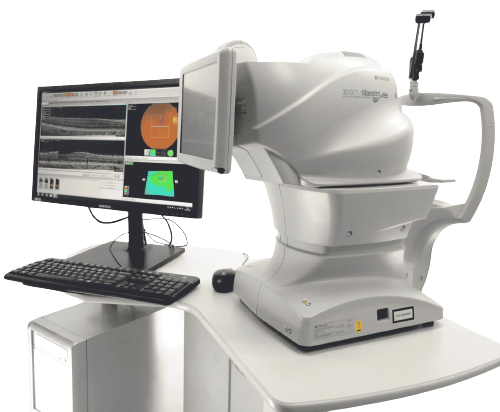Defeating Diabetic Retinopathy at Dr. Gadgil Eye Hospital & Lasik Laser Centre.

Preserving your vision is crucial, and understanding diabetic retinopathy is key to early intervention. Caused by high blood sugar, this condition can lead to symptoms like floaters, blurred vision, and dark spots. While severe cases may require treatments such as intraocular injections, laser procedures, or surgery, milder instances can often be managed with medication. Recognizing these signs is vital ,don’t overlook any changes in your vision. Seeking prompt professional help and scheduling regular eye exams, especially for those with diabetes, can make a significant difference. Stay informed about diabetic retinopathy through reliable resources, and take proactive steps to protect your eyesight for a clear and vibrant future.

Topcon’s 3D-OCT Maestro, with 6-micron resolution, offers automatic OCT, color fundus imaging, and trend analysis. A versatile tool for retinal diagnostics.
Contact us today to schedule your Diabetic Retinopathy consultation and start your journey to clearer vision.
Please call +91 8591308056.
Frequently Asked Questions About Diabetic Retinopathy
Diabetic retinopathy is a diabetes-related eye condition that occurs when high blood sugar levels damage the blood vessels in the retina. This damage can lead to vision problems and, in severe cases, blindness.
Anyone with diabetes, whether it’s type 1 or type 2, is at risk of developing diabetic retinopathy. The longer someone has diabetes and the less controlled their blood sugar levels are, the higher the risk.
In its early stages, diabetic retinopathy may not cause noticeable symptoms. However, as the condition progresses, symptoms may include blurred or fluctuating vision, floaters (spots or dark strings in your vision), difficulty seeing at night, and, in severe cases, sudden vision loss.
Yes, diabetic retinopathy can be managed and, in some cases, prevented through strict blood sugar control, blood pressure management, and a healthy lifestyle. If detected early, treatment options such as laser therapy or intravitreal injections may help prevent further vision loss.

